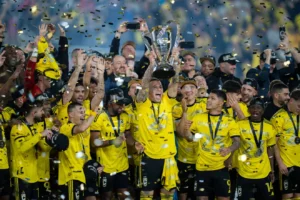The player’s labor agreement with Major League Soccer expires on January 31st and there is a real possibility of MLS locking out the players.
”Despite months of negotiations the two sides have made little progress on a new deal,” FIFPro said. ”The league is now threatening to lock the players out on Feb. 1 if the players don’t agree to a continuation of the status quo.”
All we are asking for are the same rights enjoyed by other players around the world, not just in the biggest leagues, but in leagues of all sizes,” Los Angeles Galaxy star Landon Donovan said in a statement released by FIFPro, which represents more than 50,000 players worldwide.
MLS president Mark Abbott disputed much of what FIFPro said.
”Any discussion about a lockout, players’ strike or other work stoppage is premature and, frankly, counterproductive to our ongoing mutual commitment to reach an agreement.’
Unlike other leagues where teams are owned by individual owners, MLS is a single entity, which means that players are owned by the league and not the individual teams. That is why MLS negiotates the transfer fee when an MLS player moves to a European team, and why the team only gets a percentage of the transfer. FIFPro belives that this set-up violates FIFA’s regulations.
In addition, FIFPro claims that almost 80% of MLS players don’t have guaranteed contracts. MLS sets up their player contracts as a series of league owned one-year options.
Also, because MLS owns the players contracts, a player can be transferred from one MLS team to another without his permission.
Salaries for MLS players averaged $147,945 at the start of last season, according to the MLS union, but the median — the point at which an equal amount make above and below — was $88,000 for 323 players listed.
Even that amount seems high, as many first and second years players are only making a salary in the teens or low $20,000 a year.
“What we are looking for are the same basic rights that players enjoy in other leagues around the world,” Seattle Sounders goalkeeper Kasey Keller said in a statement issued by FIFPro. ”We have made great strides in developing the game in the United States. But we can’t truly compete internationally, either for players or fans, with a system that is so radically different than other leagues around the world.”
A lockout in early February will not be that big an issue as teams will not be back in pre-season training. What MLS cannot afford is for the labor dispute to drag on into late February and threaten the MLS First Kick on March 25th

